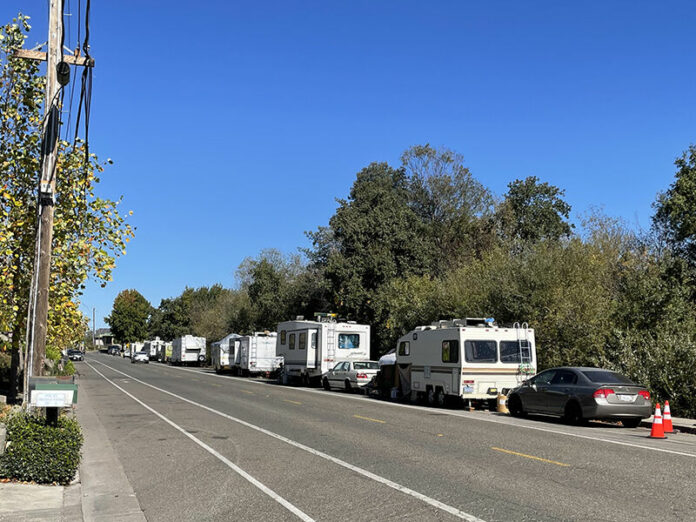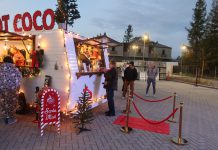In the nick of time, the City of Sebastopol may have found a place right down the road to relocate the controversial RV encampment along Morris Street as of its Oct. 27 special meeting.
The Sebastopol City Council voted to pursue a temporary RV village on city-owned property as a pilot program with Sonoma Applied Village Services (SAVS) and allow the mayor to sign a letter of intent by Nov. 1. The hamlet for the homeless community is proposed for the space behind Wischemann Hall, next to the city parking lot behind the Youth Annex.
“I’m sure the public feels like they’re in a wind tunnel with how fast this whole thing has happened,” said Mayor Una Glass. She assured the public the council was not making a final decision that night, but essentially buying time to vet the idea and still make the deadlines if the council decides to go for it.
It turns out SAVS has been searching for a place to set up a COVID-19 emergency shelter village for a year, awarded $368,000 in funding from the Continuum of Care.
According to the agenda report, this is granted “with the contingency that SAVS report at the upcoming board meeting on site control and permit updates for the Shelter Village, including that SAVS achieves city approval and permits for the Village not later than December 3, 2021 with a recommendation that SAVS provide a letter of intent with the City by November 1, 2021.”
But in another stroke of luck, the Continuum of Care pushed the deadline out to Dec. 8. The city has until then to consider the project, figure out the details and communicate with SAVS and “determine whether this is a great fit for all of us,” Glass said.
The motion included that a stakeholder group be convened as soon as possible regarding these developments.
The plan so far
SAVS President Adrienne Lauby and board member Patrick O’Loughlin presented the plan to shelter people and engage the community in developing solutions.
Lauby said SAVS found the proposed RV park could possibly fit 20 vehicles and 35 people after some of its members measured vehicles on Morris Street. O’Loughlin stated they would aim to move people into the village “hopefully” by Jan. 15, 2022 or earlier and that SAVS seeks an on-site resident manager with lived experience being unsheltered.
Lauby shared her vision for a village council where the people living there could discuss and decide on rules about how much noise they find acceptable there. Facilities would include portable bathrooms, showers, a common room, a private place to meet with therapists and kitchen space for cold breakfasts and probably not for cooking.
Lauby said the project would have a food program and most evenings, volunteer groups would offer hot meals for dinner. The site would be insured, with a full-time project manager and a part-time worker to assist residents with their needs individually, she said.
The SAVS president stated their goal is for everyone living in the park to swiftly transition to permanent housing, and because the RV park village is currently planned to operate for one year, no permanent structures are intended to be built.
At first, paid security would keep watch for some months and then SAVS would work with city police and staff about what security measures would be necessary moving forward, she said.
SAVS has already started reaching out to site neighbors on Morris Street and plans to put up a fence for the privacy and protection of those living in the village and to provide an aesthetic for the rest of the community. The location will be a COVID-19-safe site, Lauby said.
“And pretty much the only way this becomes viable is if we do it on city-owned property because there is not enough money to do this project if we have it on private property,” Glass said.
The timing is remarkable because SAVS and the city partner just as the project deadlines quickly approach and as the council’s Committee for the Unhoused was looking for funding sources and alternative sites. The council recently made the relocation of people living in RVs on Morris Street the top priority for the Committee for the Unhoused, a committee consisting of the mayor and Councilmember Diana Rich.
“It’s not everyday we trip over $350,000 to try and solve a problem. This is not a permanent solution, but this would be solving a problem we are having right now,” said the mayor.
The council agreed that the encampments along Morris Street are challenging and unsafe for everyone, including the people living in them. While many city community members have expressed as such, some attendees also took issue with how the proposed site could impact its neighbors.
Tim Dimick raised that the proposed site is near a teen center and a community center serving young children and could affect the youth more than anyone else. He wondered if the site would make Sebastopol a magnet for homeless communities from outside the area.
Chris Anderegg, board president of the Sebastopol Cultural Community Center, said its Youth Annex is right by the proposed site and that they weren’t included in prior discussions about the village. He said there has already been an incident where someone experiencing psychosis was walking through an outdoor class screaming at small children.
Arthur George of West County Homeless Advocates voiced his support for the parking village and that he believes Sebastopol is in fact taking on its fair share to address homelessness and getting things done, unlike other cities in the county.
Public librarian Courtney Klein said she also supported the proposal and that thinking Sebastopol shouldn’t have to take on so much responsibility for homelessness isn’t helpful. She said she wanted a safety net for people facing shorter lifespans related to living unhoused and that this is an opportunity to sway other cities nearby.








